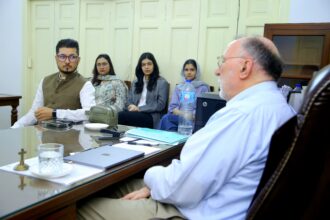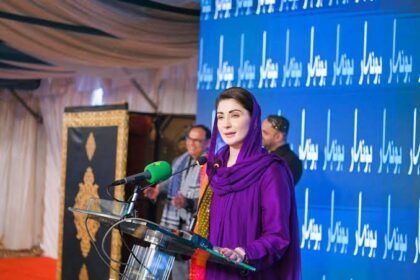An election campaign is already underway between Donald Trump hailing from the Republican Party (GOP) and Kamala Harris from the Democratic Party. The latter was chosen for presidential candidate after Joe Biden’s dwindling position in the American politics, which was evident in the first debate wherein Joe Biden was seen struggling to present a comprehensive response. The confrontation between the two presidential candidates Donald Trump and Kamala Harris has put the American public in a tough situation. Trump’s policies on the future of the US are somewhat vague; however, he is garnering public support due to his promising rhetoric, which is liked by the public at large. He is best at using the media as his mouthpiece. However, it is responsibility of the American public to realize the fact that the office of the president is a serious job, and the person who they elect as their next head of the state would not only shape the politics of the United States but also influence the politics of the rest of the world. On the other hand, if Kamala Harris wins, she will be first female president of the US, which has never happened earlier. Despite all of the talk on women empowerment and women rights, the US to date has failed to have a woman as its commander-in-chief. This speaks of the systematic barriers that still exist for women who aspire for powerful positions. In all regions, the world politics has a linkage with the US policies that mainly focuses on strengthening US-led ‘world order’. It is evident that the US wants a leading role and authority to ensure that its hegemony remains intact in the region while other states pose a challenge to this myopic policy. Amid this power struggle, the regional dynamics continue to change and have a historical perspective.
The politics of establishing one’s authority worldwide started after the conclusion of the Second World War in 1945. Two major powers – Soviet Union and America – emerged with the claim of superiority at the international front. Due to these policies, the center of power remained bipolar giving a boost to the continuation of the Cold War, which continued for decades and ended after the collapse of the Soviet Union in 1991. It was believed at that time that the world would become unipolar as the US appeared as the ‘only’ superpower to claim superiority over ‘all’ other nations. However, this belief proved invalid due to certain factors. First, China emerged on the world level as a state with strongest economy coupled with its military might. Russia made a relatively quick revival under President Vladimir Putin from the ashes of the Soviet Union due to its abundant natural resources and skilled workforce. The economic revival in Brazil, China, India and South Africa also gained importance on the world stage. However, the situation in the Middle East remained stagnant since 1990. In this perspective, the US is a key stakeholder in the world politics and wants its hegemony intact. However, the US policy is vague regarding its relationship with other states, especially in South Asia. Overall, the US government needs to re-assess its policies and work for promoting regional and global peace. The ongoing conflicts in certain states of South Asia require a policy review on part of the new US administration. Regional peace is somehow dependent on the American relationship with South Asian countries. The freedom movement in disputed Jammu Kashmir State witnessed a turning point when the Indian government unilaterally annulled the ‘special status’ granted under the Article 370 of the Indian Constitution to the disputed Kashmiri state. In this situation, Pakistan has attached its hopes with the new administration, whichever is elected that it would help resolve the decades-long Jammu Kashmir issue.
Historically, mistrust has always been the main point of the changing relationship between Pakistan and the US. A main reason is the change of power actors in Pakistan who took decisions that made a lasting impact in the past. Pakistan’s strategic importance in the region also compels Washington to never sever its ties with Islamabad. Washington is heavily relying on Islamabad for dealing with the situation in Afghanistan. Currently, the situation in Afghanistan is stagnant but it could pose challenges to both the US and the region anytime soon due to unpredictable attitude of the Kabul administration. The interdependence is essential for the two states as both have common enemies in the form of terror groups. Presently, no one is sure regarding future strategy of the US towards Afghanistan and ties with Pakistan. Another factor that requires urgent attention of the US is a ‘threat’ from Iran after the assassination of Hamas leader Ismail Haniyeh in Tehran. Reportedly, the US officials are taking steps to ease tensions with Iran. In order to normalize the relations, the US has allegedly shared a list of Israeli spy agents, who are reportedly operating in Iran. However, if the US is sincere in its efforts to help facilitate peace efforts, it has to withdraw its all-out support to Israel. All the above discussion portrays the US as a key stakeholder in the region, who wants its hegemony intact. However, it is a fact that no state can impose its policies on other states. It is time for the new US administration to get engaged with other regional powers for ensuring peace especially in South Asia, which is sunk into a quagmire of violence, corruption and lawlessness. Now is the time, for the new set-up in the US to review its own policies in the larger interests of regional and world peace.






